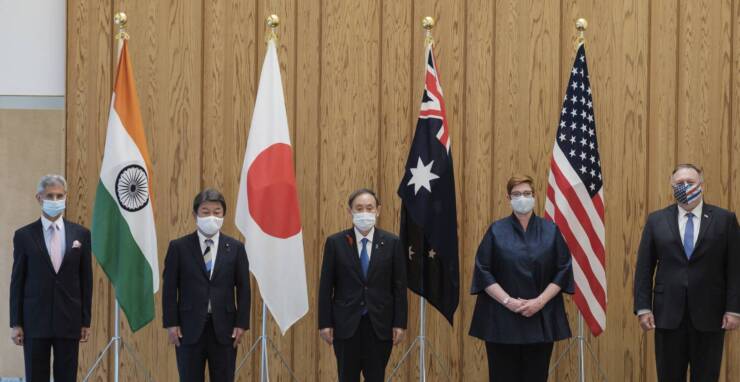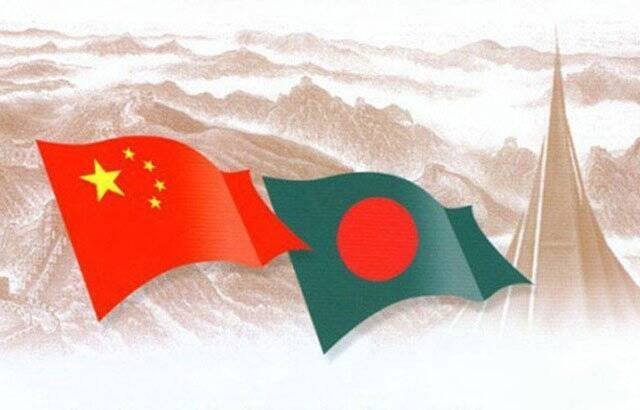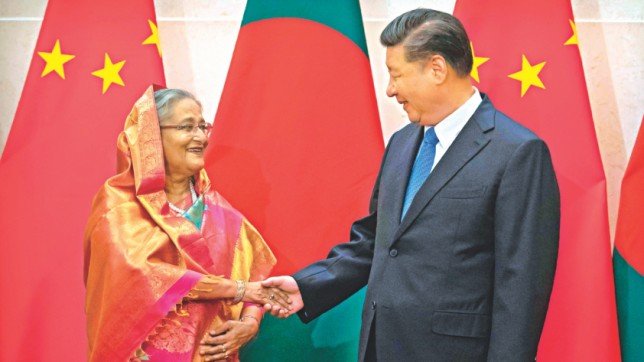
Chinese ambassador to Bangladesh Li Jiming, while addressing a press conference in second week of May 2021 at Dhaka warned that Bilateral ties between two countries will be substantially damaged if Bangladesh aligned with four nation group QUAD comprising of Australia, Japan, United States and India, directly or indirectly. Beijing does not want any form of participation of Bangladesh in this military alliance against us said Defence Minister Wei Fenghe of China during his meeting with Bangladesh Prime minister Sheikh Hasina and advised to keep away from this hegemonic organisation. Bangladesh has expressed shock and surprise. Bangladesh Foreign Minister A K Abdul Memon told’ Dhaka Post’ that we are an independent, sovereign nation and we do not want any directions from anyone. We are not invited by QUAD. We maintain neutral relations with our neighbours. To understand Sino Bangladesh impasse, we have go back in history.
Bangladesh was born on December 16, 1971, as Pakistan was dismembered by blitzkrieg of Indian Army and Sheikh Mujibur Rahman was sworn as the first head of secular Awami league government .The new nation followed the policy of maintaining cordial relations with neighbours but stayed away from Pakistan and china. China used veto to support Pakistan brutal attack on its eastern part in1971 and later, to reject Bangladesh entry in United Nations in 1974. On August 15, 1975, an ISI sponsored bloody coup was conspired uprooting the Bang Bandhu Mujibur Rahman government. He, along with his family members, was brutally shot and killed. Sheikh Hasina, eldest daughter of Mujib survived as she was in West Germany along with her husband. Later she was given asylum in India. The coup was brainchild of Major Khandakar Ahmed group. After 3 months, second coup was initiated by Brig Khalid Mosharaf, a war veteran of 1971 independence war on November 3, 1975, who executed the conspirators. Third coup took place on November 8,1975, killing Brig Khalid and Gen Ziaur Rahman emerged as martial law dictator with support of Jatiya Samaj Tantrik Dal and served till 1981, when he was also assassinated.
China suddenly recognised Bangladesh August 31, 1975, as rebels came to power and later, established diplomatic ties in 1976 with General Ziaur Rahman as the head of state. Bangladesh established an embassy in Beijing and consulates in Kunming and Hong Kong and an embassy of China was opened in Dhaka. Later, Sheikh Hasina revived her father’s party and challenged the military rule. She came to power in 1996 is in power for the first time. She was routed in 2001 and again bounced back in 2009. Bilateral trade between two nations advanced to new scale but tilted in favour of China. The trade deficit against Bangladesh stands at 18 billion US $ in 2020/21. Bangladesh exports textiles, Jute products and raw materials to China and forms 70 per cent of total share and imports machines, electronic goods, automobiles, petroleum products, military hardware, and computers from China which compose 31 per cent of total imports of the nation. The total net foreign direct investment is 1.2 billion US $.making it the largest recipient in South Asia.

In mid 1980s, China gradually forged close military, commercial and cultural ties with Bangladesh and pumped military equipment and financial aid. Zia was invited to China in 1976. Later, President Mohmmad Ershad visited Beijing in July 1987. A vital bridge was constructed and financed by Chinese on Dhaka Munshiganj Highway on Bhuri Ganga River and was named as Friendship Bridge. On October 4, 2000, US 300 million $ were given as soft loan to Bangladesh to commemorate Silver Jubilee of Friendship and a postage stamp was also issued. Premier Wen Jiabo visited Bangladesh in April 2005 and various MoUs were signed. Direct air link between Dhaka and Beijing via Kunming was established, Express highway between Chittagong and Kunming through Myanmar was sanctioned. Modern fertiliser factory was also approved with free Chinese aid instead of loan in Chittagong. A purchase delegation purchased Bangladesh goods worth 50 million US $. A China financed 5 star state of Art Exhibition centre was also built in Dhaka. Shah Amanat Bridge is also build with Chinese technology and funds. New high speed railway corridors were also cleared between Dhaka and Chittagong. China offered a lollypop to Bangladesh on July 1, 2020 and made 97 per cent of Bangladesh export products duty free. Tariff Commission of China has declared 8256 Bangladesh products at zero tariff giving boost to small scale and medium scale industries of Bangladesh also will enable reduction in huge trade deficit.
Military hardware of Bangladesh Armed forces is of Chinese origin since 1971, as most of Arms captured from Pak Army were gifted by India. Moreover, after fall of Mujib regime, Bangladesh received Chinese weapons in package deal. China and Bangladesh signed a Defence Cooperation Agreement in 2005, which covered Defence of the shelf procurement, production and Military training. In 2006, China supplied 14 T 69 ll tanks, 16 J7 Fighters, 65 Arty guns, 114 Anti tank missiles on long credit basis with low interest rates. Moreover, a Chinese made frigate and 4 Missile boats of Chinese origin are already operational in Bay of Bengal. Two Frigates have been gifted to Bangladesh in 2011 .The deal for two submarines has also been signed. A consignment of C 803A anti ship missiles is in the pipeline. In return, Chittagong port facility is being used by a Chinese warships/ Ocean liners and submarines as logistic base. China although is not part of South Asian Association of Regional cooperation SAARC Group, but China was invited as an observer during Begum Zia regime. Moreover both countries are part of another group Bangladesh, China, India, Myanmar forum (BCIM). Bangladesh is like a fish in the Chinese golden bowl.

The second nation on Red list is Sri Lanka, which is neck deep under heavy debt under guise of soft term loans, assistance and aid. They have transferred Hambantota port along with 6000 hectares of coastal belt to China on 99 years lease in 2017. Similar to British colonial policy of 19th century as Hong Kong was leased to British in 1898 for 99 years. Chinese foreign minister called on Sri Lankan President Cotabaya Rajpaksha and also advised him against joining QUAD or providing any support to the military alliance. Sri Lankans have assured China that they will follow neutral policy and not harm Chinese interests. Chinese have also assured them a lucrative defence package and infra-structure projects funding at honourable terms. Colombo port is a luxury heaven for Chinese U boats. Myanmar, Afghanistan, Nepal, Laos, Thailand, Maldives are also in debt trap of Chinese fishing nets.
Chanakya said in 300 BCE “You can win over a country either by might or by lending money“.
India has to play a crucial role to keep important neighbouring countries with huge maritime potential in our camp with liberal infrastructure developments funding, soft loans, boost strong cultural relations, human resources development initiatives, medical aid in form of vaccines and equipment, natural disasters relief material, education facilities and military protection if asked. . Indian sub-continent and Indian Ocean has to be dominated by us for which we must have to have geo political goals clear with strong blue water Navy with 360 degree, all weather surveillance, sharp intelligence and swift hit capability.
-The writer is an Indian Army veteran and a defence analyst. He has keen interest in geo-strategic affairs and writes regularly on internal and external affairs issues related to India and neighbours. The views expressed are of the writer and do not necessarily reflect the views of Raksha Anirveda








